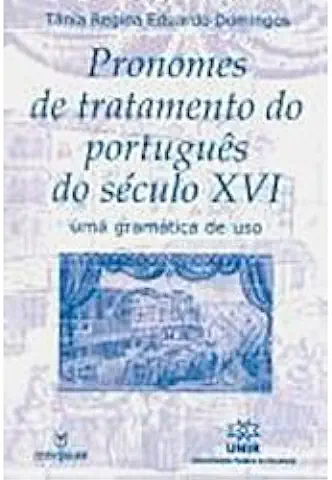
Portuguese Pronouns of Address in the 16th Century - Tânia Regina Eduardo Domingos
Portuguese Pronouns of Address in the 16th Century: A Linguistic and Sociohistorical Study
Introduction
In this groundbreaking study, Tânia Regina Eduardo Domingos delves into the rich tapestry of Portuguese pronouns of address during the 16th century, a period of profound linguistic and sociohistorical transformation. Through a meticulous analysis of a vast corpus of texts, Domingos sheds new light on the intricate interplay between language, power, and social hierarchy in early modern Portugal.
Pronouns of Address: A Reflection of Social Structure
Pronouns of address, such as "tu" and "vós," serve as linguistic markers that reflect the social status, power dynamics, and interpersonal relationships between speakers and addressees. In 16th-century Portugal, these pronouns were not merely grammatical tools; they were imbued with profound social significance.
The Rise of "Vossa Mercê"
One of the most striking findings of Domingos' research is the emergence and widespread adoption of the pronoun "vossa mercê" during this period. This honorific form, which literally translates to "your mercy," transcended social boundaries and became a ubiquitous term of address, used by both the nobility and the common people.
Linguistic Innovation and Social Change
Domingos argues that the rise of "vossa mercê" was not a mere linguistic phenomenon; it was a reflection of broader social changes that were reshaping Portuguese society. The increasing social mobility and the growing influence of the merchant class challenged traditional hierarchies and created a need for a more flexible and inclusive form of address.
Linguistic Variation and Regional Identity
Domingos also explores the regional variations in the use of pronouns of address, demonstrating how linguistic patterns mirrored regional identities and cultural differences within Portugal. These variations provide valuable insights into the complex social and cultural dynamics of the time.
Conclusion
Portuguese Pronouns of Address in the 16th Century is a tour de force that combines meticulous linguistic analysis with a deep understanding of social history. Domingos' work not only contributes to our knowledge of Portuguese language and culture but also offers a unique perspective on the intricate relationship between language and society. This book is a must-read for scholars of linguistics, history, and anyone interested in the fascinating evolution of human communication.
Key Features:
- Comprehensive analysis of Portuguese pronouns of address in the 16th century
- Exploration of the social significance and power dynamics embedded in pronouns
- Examination of the rise of "vossa mercê" and its impact on social hierarchy
- Investigation of regional variations in pronoun usage and their cultural implications
- Interdisciplinary approach combining linguistics, history, and sociolinguistics
Benefits for Readers:
- Gain a deeper understanding of the evolution of Portuguese language and culture
- Explore the intricate relationship between language and society
- Discover the social and historical context behind pronouns of address
- Uncover the fascinating linguistic patterns that shaped early modern Portugal
- Enhance your knowledge of Portuguese linguistics and sociolinguistics